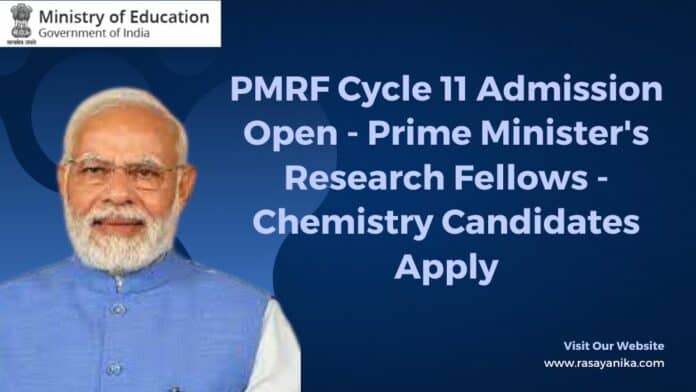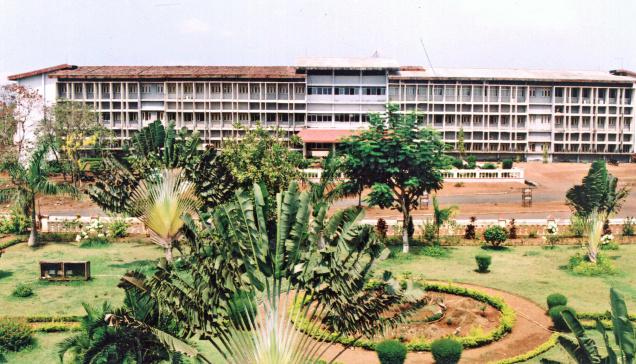Prime Minister’s Research Fellows
RESEARCH
The Prime Minister’s Research Fellows (PMRF) Scheme has been designed for improving the quality of research in various higher educational institutions in the country.
With attractive fellowships, the scheme seeks to attract the best talent into research thereby realizing the vision of development through innovation. The scheme was announced in the Budget 2018-19.
INSTITUTES
The institutes which can offer PMRF include all the IITs, all the IISERs, Indian Institute of Science, Bengaluru and some of the top Central Universities/NITs that offer science and/or technology degrees.
STUDENTS
The candidates will be selected through a rigorous selection process and their performance will be reviewed suitably through a national convention.
Guidelines For Prime Minister’s Research Fellows (PMRF)
ELIGIBILITY AND APPLICATION PROCEDURE
Candidates can apply for PMRF through two channels:
DIRECT ENTRY CHANNEL
To apply for PMRF through this channel, the candidate must satisfy all of the following criteria:
(1) The applicant should have satisfied one of the following criteria in the preceding three years from the date of submission of the application :
(a) completed or be pursuing the final year of four (or five) year undergraduate or five year integrated M.Tech. or 2 year M.Sc. or five year undergraduate postgraduate dual degree programs in Science and Technology streams from IISc/IITs/NITs/IISERSs/IIEST and centrally funded IIITs. These candidates should have secured a CGPA/CPI of at least 8.0 (on a 10-point scale). For applicants in the five year integrated or dual degree programs, if separate CGPAs/CPIs are awarded for UG and PG parts of the program, the CGPA/CPI of the UG part (first four years) will be considered.
OR
(b) completed or be pursuing the final year of four (or five) year undergraduate or five year integrated M.Tech. or five year integrated M.Sc. or 2 year M.Sc. Or five year undergraduate-postgraduate dual degree programs in Science and Technology streams from any other Institute/University recognized in India, not covered in 1(a) above. These candidates should have secured a minimum CGPA of 8 or equivalent apart from a minimum score of 650 in the respective GATE subject, or a UGC/CSIR JRF rank of 100 or less, or those with NBHM fellowship.
OR
(c) qualified GATE and be pursuing or have completed M.Tech./MS by research at one of the PMRF Granting Institutions having a minimum CGPA or CPI of 8.0 (on a 10-point scale) with a minimum of four courses at the time of application.
(2) They apply for Ph.D. programme in one the PMRF granting institutes and get selected in the programme.
(3) The PMRF granting institute, which has admitted the student in the Ph.D. programme makes a strong recommendation, and uploads the relevant information at the PMRF web-portal. Student can only get admission in those institutes where he/she has got selected and wishes to seek admission (i.e., selection in one institute and availing PMRF from another institute which does not support the student for PMRF will not be allowed).
(4) The metrics on which the candidates will be judged will include (but not restricted to): research exposure, publications, performance in international competitions (like Math. Olympiad, ACM ICPC Programming Contest), grades and recommendation letters.
(5) Within 12-18 months of admission into the PhD programme, the progress of the candidate will be reviewed by the PMRF panel, and continuation of PMRF will be subject to candidate’s satisfactory performance. A strong research proposal is
mandatory, and a clear assessment from the host institution in support of continuation of PMRF status. Due weightage would be given to publication in reputed journals/conferences.
LATERAL ENTRY CHANNEL
To apply for PMRF through this channel, the candidate must satisfy all of the following
criteria:
(1) The candidate should be pursuing Ph.D. in one of the PMRF granting institutions. Further, he/she should have completed at most 12 months in the PhD programme if he/she joined the programme with a Master’s degree; and should have completed at most 24 months in the PhD programme if he/she joined the PhD programme with a Bachelor’s degree. The relevant period of 12 months or 24 months will be counted from the date of admission in the PhD programme till the
date of application for lateral entry. A candidate can be considered at most twice through lateral entry channel PMRF. In case of Integrated M.Tech/MSc
(2) The candidate should have completed at least four courses in the PhD programme, each of which should be a full-semester course, and obtained aggregate CGPA of 8.5 (out of 10) or higher. Only full subject courses are considered; General courses such as Seminar, Communication Skill, Research Methodology etc are not considered as full subject courses.
(3) The PMRF Granting Institute, in which the student is enrolled, makes a strong recommendation for the candidate and uploads the relevant information on the PMRF web-portal. This includes a research proposal and soft copies of publications (which could include those under submission).
(4) Candidate continues work only in the host institute and transfer to another PMRF eligible institute is not allowed. Further, once enrolled in a PhD programme through lateral entry, the candidate cannot be considered for direct entry channel in a subsequent year.
(5) The metrics on which the candidates will be judged include (but not restricted to) a strong research proposal, publications record and grades. Due weightage should be given to publication in reputed journals/conferences.
FOR BOTH LATERAL ENTRY AND DIRECT ENTRY CHANNELS:
Broad areas under which Applications can be made For Prime Minister’s Research Fellows (PMRF) :
Broad area: 06-Chemical Engineering, Textile Engineering.
Sub areas include (but not limited to)
- Chemical Engineering: Heterogeneous Catalysis, reaction engineering
- Chemical Engineering: Molecular simulation and modelling, CFD, process control and instrumentation
- Chemical Engineering: Fuel cell, energy starage, hydrogen production, petroleum engg
- Chemical Engineering: Wastewater treatment, environmental engineering
- Chemical Engineering:Electrochemical engg, corrosion
- Chemical Engineering: Fluid mechanics, rheology
- Chemical Engineering: Heat transfer and thermodynamics
- Chemical Engineering: Mass transfer, membrane, separation processes
- Chemical Engineering: Biomedical application, point of care device
- Chemical Engineering: Food science and technology, smart packaging
- Chemical Engineering: Carbon capture
- Textile Engineering: Natural fibre composite, electrospun nanofibre, Polymeric Nanocomposites
- Textile Engineering: Yarn engineering
- Textile Engineering: Fibre science and technology
- Textile Engineering: Nanocoating, nanomaterials for textile
- Textile Engineering: Apparel Engineering
- Textile Engineering: Garment Technology
- Textile Engineering: Smart textile, phase change materials for hest storage
- Textile Engineering: Nonwoven and Technical Textiles
- Textile Engineering: Yarn and Fabric Production
- Textile Engineering: Medical Textiles
Broad area: 07-Materials Science and Metallurgical Engineering, Mining Engineering.
Sub areas include (but not limited to)
- Mechanical behaviour of materials and working
- Physical metallurgy (Alloys/materials development and materials characterization
- Electronic materials, devices and batteries
- Extractive metallurgy of ferrous and nonferrous metals/alloys and continuous casting
- Modeling/Simulation/machine learning related to materials
- Corrosion and environmental degradation, wear and surface modification
- Materials processing/advance materials manufacturing/Joining/Casting
- Biomaterials
- Mining
Broad area: 09-Chemistry.
Sub areas include (but not limited to)
- Theoretical & Computational Chemistry
- Spectroscopy/Photochemistry
- Thermodynamics/Kinetics/Electrochemistry/ other areas of Physical Chemistry
- Solid State Chemistry
- Coordination /Organometallic Chemistry/Bio-Inorganic Chemistry
- Synthetic Organic Chemistry
- Physico-organic Chemistry/Bio-Organic Chemistry
- Materials Chemistry
Broad area: 10-Interdisciplinary areas in Science and Engineering.
Sub areas include (but not limited to)
- Analytics & Data Mining
- Artificial Intelligence & Machine Learning
- Computational Fluid Dynamics (CFD) & Molecular Dynamics
- Energy, Environment, & Process Safety
- Human-Computer Interaction (e.g., e-Learning & Image processing)
- Microfluidics, Nanofluidics & Transport Processes
- Operations & Supply Chain Management
- Soft Computing & Control Engineering
- Wastewater Treatment & Membrane Separation
- Indian Knowledge Systems
- Biotechnology and Biomedical devices
- Indian Knowledge Systems.
Deliverables
(a) At the time of joining, each Fellow shall be given deliverables to be achieved each year. This will be decided by the assigned guide and the department which the fellow is joining.
(b) The deliverables are to be designed keeping in view the topic selected by the fellow.
(c) There shall be an annual review of PMRF fellows. The candidates would continue to avail the fellowship in the next year only if their performance is found satisfactory by the review committee. The review will be a rigorous process, and can be done in the form of a national convention (for each discipline). The nodal institute for the discipline may form multiple expert panels to evaluate the progress of the PMRF fellows. Each such panel can have 3-4 members, with at most 2 members from the host institution.
(d) A PMRF fellow is expected to teach once a week in a neighborhood ITI/Polytechnic/Engineering College/School/NPTEL other than their own PMRF granting institute.PMRFs are free to choose to do TAship in schools, science colleges, polytechnics, engineering colleges- either in online or offline mode.The expectation is to transfer technical knowledge to students from other institutes.
Direct interaction in the offline mode is preferred, but in case that is not feasible, PMRF can also teach online.
It should be ensured that the PMRFs complete the teaching responsibility by interacting with students for ~ 1 hour/week, which would imply 50 hours per year/ 25 hours per semester. Preparation time is not counted towards the teaching hours described above.
Certification of teaching, attested by the respective authorities in the place where the teaching is carried out, should be submitted during the annual review, for the review period.
PMRFs can do their TAship in schools inside the IITs.
Suggestions for finding your TA work :
A) NPTEL – support@nptel.ac.in.
B) SFRI – Science for Rural India, http://www.scienceforruralindia.in/contact-us/.
C) Campus School/Other neighbourhood schools.
D) College from which you graduated.
E) Contact from your advisor/co-advisor/HoD/Institute Co-ordinator/Institute Outreach cell/Alumni Office.
(e) If the deliverables are not achieved, the fellowship could be brought down to the institutional fellowship level or even discontinued.
Fellowship For Prime Minister’s Research Fellows (PMRF)
The following would be the fellowship for the PMRFs:
Year 1: Rs. 70,000
Year 2: Rs. 70,000
Year 3: Rs. 75,000
Year 4: Rs. 80,000
Year 5: Rs. 80,000
Apart from this, each Fellow would be eligible for a research grant of Rs. 2 Lakhs per year (total of Rs 10 Lakhs for five years).
The tenure of fellowship will be till the end of the 4th year of PhD for students from integrated courses and till the end of the 5th year of PhD for B.Tech. (or equivalent) students. For students selected through the lateral entry channel, the PMRF scholarship and obligations will continue only for the remainder of the student’s stay in the doctoral program. No retrospective payment will be made.
Industry participation in the PMRF program would be explored through CSR funding or otherwise to enable industry to sponsor Fellows.
18-July-2023
Cycle 11 Admission.
Timelines:
- 12-July-2023: Portal opens and Institute coordinators can start uploading nominations.
- 07-Aug-2023: Deadline for nominations to be submitted by PMRF granting Institutes.
- 11-Aug-2023: PMRF Portal opens for applicants, nominated applicants will be given login instructions on email.
- 18-Aug-2023: Submission deadline for applicants (detailed SoP/RP/Grade Cards etc to be submitted in the portal). The Portal will close on 18-Aug-2023, 6:00 PM.
- 23-Aug-2023: Deadline for recommenders to submit the recommendations in the portal.
Prime Minister’s Research Fellows (PMRF) Cycle 11 Admission Open
FAQs
1. What is the basic eligibility criteria for applyingto the PMRF Scheme?
A: You are eligible to apply to PMRF only after getting admitted in one of thePMRF granting institutes, for a PhD program in the area of Science or Engineering/Technology. Please click on the following link to know the details of the granting institutes: https://www.pmrf.in/.
2. How do I apply for PMRF Direct Entry after joining Phd in any one of the PMRF granting institutes?
A: Based on the eligibility criteria and on the candidature, the granting institute will nominate you. Institutes may also conduct internal interviews prior to nomination. You should have been selected in the PhD programme at the beginning of the current semester. In case you were selected in the PhD programme earlier, you can only be considered in the lateral entry mode.
Nomination does not guarantee acceptance for PMRF. After nomination, an expert panel will conduct a detailed evaluation of the nominated scholars and make decisions.
3. What are the eligibility criteria for PMRF?
A: Please find the link to know the eligibility criteria https://www.pmrf.in/guidelines
4. How many times a Scholar can apply for direct entry?
A: Once.
5. How many times can a scholar apply for lateral entry?
A: Twice.
6. Can you please tell us about the admission process?
A: Admission to PMRF is a four-stage process.
Stage 1: Nomination: PMRF Granting institutes send the nominations of eligible candidates to the National Coordinating Institute through the PMRF portal.
Stage 2: Detailed Application: Nominated scholars make a detailed application through the PMRF Portal, under one of the Broad Areas. They are also required to give names of recommenders, who are in turn required to login to the portal and submit their recommendations.
Stage 3: Evaluation: The submitted applications are reviewed in detail by a National Panel for each broad area. The panel considers several aspects, arrives at a collective decision and makes the recommendation to NCC with a rank list.
The broad areas are listed below :
1: Civil Engineering, Earth Science, Architecture, Ocean and Naval Engineering.
2: Mechanical Engineering, Aerospace Engineering, Design
3: Electrical Engineering, Electronics Engineering
4: Computer Science & Engineering, Data Science, Mathematics
5: Biomedical Engineering, Biological Sciences, Agricultural Sciences.
6: Chemical Engineering, Textile Engineering
7: Materials Science and Metallurgical Engineering, Mining Engineering
8: Physics
9: Chemistry
10: Interdisciplinary areas in Science and Engineering
Stage 4: Final Selections are done by the National Coordination Committee (NCC) based on the ranks and the number of seats allocated for each PMRF granting institute.
7. I am a PhD student in one of the PMRF granting institutes. Who should I approach for Direct or Lateral entry nomination?
A: You should contact the Institute Coordinator. Please find the institute coordinator details in the link https://www.pmrf.in/contact.
8. Is there a central portal where I can apply for Direct Entry?
A: No. You have to contact your institute coordinator for your nomination.
9. When will the interviews for PMRF selection be held?
A: As such, there are no interviews for selection.
10. I am enrolled in an Integrated Masters-PhD programme. Will the courses done during the completion of Masters requirements count towards the 4 course requirement for lateral entry?
A: Yes. These will count if you are enrolled in Integrated Masters-PhD programme or you have converted to a PhD programme during the tenure of Masters programme. Note that courses such as Thesis, Project work, Seminar or any other course which only requires one-to-one interaction with an instructor will not count towards the 4 course requirement. These should also be full-subject courses (and not general courses such as research methodology, literature survey, ethics etc).
11. Is there a reservation quota for PMRF?
A: No
12. Is a PMRF fellowship available for PhD scholars in Philosophy?
A: PMRF fellowship is open only to scholars pursuing PhD in Science and Engineering/Technology.
13. I converted from a Masters programme to PhD programme in one of the PMRF granting institutes. Am I eligible for direct entry ?
A: No. Candidates who convert from Masters to PhD programme during the tenure of Masters programme, or complete requirement of Masters programme during an Integrated Masters-PhD programme are not eligible for Direct Entry. They may be eligible for Lateral Entry.
14. Once I get nominated by my institute, what is the application process?
A: Once the PMRF committee receives your nomination (through your institute), you will receive a link to the PMRF portal to submit your application. You will be asked to submit details of your academic background along with transcripts, details of research experience or internship, CV, research proposal / statement of purpose, list of publications, and details of recommenders who are willing to write a strong letter of recommendation for you.
Details of documents uploaded by Direct and Lateral Entry Fellows will be sent to you along with the portal login details, once you are nominated.
15. Can you tell us about the TAship in PMRF?
A: A PMRF fellow is expected to teach once a week in a neighborhood ITI/Polytechnic/Engineering College/School other than their own PMRF granting institute.PMRFs are free to choose to do TAship in schools, science colleges, polytechnics, engineering colleges- either in online or offline mode.The expectation is to transfer technical knowledge to students from other institutes.
Direct interaction in the offline mode is preferred, but in case that is not feasible, PMRF can also teach online.
It should be ensured that the PMRFs complete the teaching responsibility by interacting with students for ~ 1 hour/week, which would imply 50 hours per year/ 25 hours per semester. Preparation time is not counted towards the teaching hours described above.
Certification of teaching, attested by the respective authorities in the place where the teaching is carried out, should be submitted during the annual review, for the review period.
16. Students who did their B.Tech. from PMRF granting institute and Master’s from non PMRF granting institute are eligible for PMRF direct entry or not?
A: The immediate prior degree would be considered, since the PhD admission would have been based on the prior degree. Hence the students are not eligible for direct entry.
17. Can I get a 3B comment eventhough the immediately previous review is comment 1 or 2?
A: If any one of the previous review comments is “3A or Needs Improvement”, then, as per the guidelines, review committee will have the option to give 3B or 3C directly based on your performance in the review.
Prime Minister’s Research Fellows (PMRF) Cycle 11 Open. Prime Minister’s Research Fellows (PMRF) Cycle 11 Admission Open. Looking for latest chemistry and Pharma job openings, follow Rasayanika Facebook and Telegram and subscribe to our youtube channel for the latest updates on chemistry and Pharma job




















































